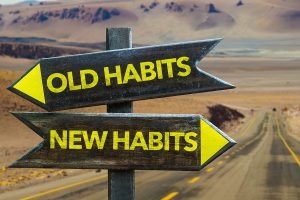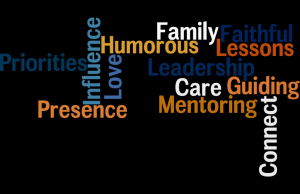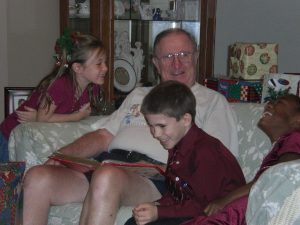Habits Help Define Us
 Did you know that your brain is programmed for efficiency? It will naturally find a way to turn routine actions into habits so the brain can rest more often.
Did you know that your brain is programmed for efficiency? It will naturally find a way to turn routine actions into habits so the brain can rest more often.
I learned this as I went through Charles Duhigg‘s book The Power of Habit. It’s not a new book – been out for a few years – but my list of books is so large I have to vacillate between older and newer books I read or listen to or simply peruse.
So your brain creates habits out of routine. Sometimes that is good and sometimes not so good. One of the things I got from Duhigg’s book is that the way to defeat a less desirable habit is to break the routine by choosing different actions and rewards. It is something that requires daily effort to establish or destroy habitual behaviors, whether good or bad.
What Are You Doing Today?
John Maxwell says that “The secret of your success is determined by your daily agenda.” In other words, success as a leader means that you are establishing habits through your daily routine and the decisions and priorities you make. Becoming a great leader is a process and not a momentary flash of brilliance.
The more we establish daily practices of leadership behaviors we create routines. These routines then lead to habits. We find ourselves unconsciously doing the right things and adding value to our people.
[tweetthis]Becoming a great leader is a process and not a momentary flash of brilliance.[/tweetthis]
Four Every Day Habits for Leaders
1. Growing 1%
Now here is a real challenge for us. We KNOW we need to be working on our growth yet we tend to relegate it to the “spare moments” of our time. How much spare time do you find yourself with during the workweek? Yeah, me too.
So if finding spare time is not a real possibility, then logically (and emotionally) the only real alternatives are to schedule it in as a priority or do absolutely nothing.
Doing nothing carries substantial penalties.
When we DO work on our growth, it is usually in frantic spurts of energy, unfortunately followed by extended periods of inactivity. The results are less effective because we get it in so rarely and want to therefore get through as much as we can. It overwhelms us and the outcome is that we remember practically nothing. Certainly we didn’t apply it.
Instead of overwhelm, we apply the principle of elephant eating. You have probably heard the old maxim, “How do you eat an elephant? One bite at a time!” That’s the secret here. Just focus on activities EVERY DAY that help you grow just 1% a day. Read a few chapters of a non-fiction book, such as a leadership book, or one on relationships, or a biography. Practice a skill you are trying to master. Just focus on the routine of the 1% growth and create the habit.
Just remember it must be intentional and it must be scheduled.
2. Looking for Good
As leaders our instinct is to walk in and find out what’s going wrong and what needs to be fixed. We spend too much time on the problems. We lose sight of all the people who really fix the problems and keep things going.
So instead of going in looking for problems to solve develop the routine of looking for people to compliment. As the saying goes, “catch people doing good.” When they do the right thing at the right time, when they go the extra mile, when they soothe over a customer, when they help a teammate out. Look for the behaviors you want them to repeat. Immediately then make a point of recognizing it according to the individual’s comfort level. Some folks, like me, want to be recognized publicly and loudly for the good things they have done; others prefer a quiet “well done“.
The results of this will be a brighter outlook for you on the day and a boost in morale not just for the individual employee but for those around them as well. Think what it would be like if your employees were all striving for a compliment from you. Sure, you may end up spending an inordinate amount of time complimenting people but if you can think of better things to do with your time then you need to go back to Leadership 101.
3. Meeting One-on-One
 Leaders need to be able to care about their people enough to be open to connect with them. Without caring, you can’t connect. Without connecting, you can’t influence. Without influence, you can’t lead.
Leaders need to be able to care about their people enough to be open to connect with them. Without caring, you can’t connect. Without connecting, you can’t influence. Without influence, you can’t lead.
You learn to care by spending time one-on-one getting to know them better. Ask questions and then….shut up and listen. Ask about their dreams, their family, what they do in their spare time. So each day you meet with one person to listen to them talk about their favorite subject – themselves.
This needs to be a daily habit because leaders need to keep in the know. Things change. We often have to be reminded of what we learned before. They need to know you mean it; that you truly care and it is worth keeping in touch regularly. It doesn’t need to take more than 15-30 minutes of your time each day and yet pays huge dividends.
4. Ridding Yourself of Work
So where will you find the time to work on personal growth, compliment others, and meet with individuals? Simple. Find something in your work load every day that you can hand out to someone else to do.
You see, as leaders most of our wasted time during the day is doing things that someone else could do just as well or possibly even better. In fact, experts estimate we spend 80% of our time doing that. We have held on to them for various reasons; because we enjoy it or because we have always done it or even for the sense of control it gives us.
Spending time doing things others could do takes away from our ability to do things only we can do or should do. Therefore, each day find something to get rid of and lighten your load.
By The Way
One quick note on what you read here. I attempt to add value to you with what I write. I choose my topics based on
- what people tell me
- what I think I would like to hear
- what I read
- what I need to hear myself. I figure if I need to hear it, perhaps you do too!





